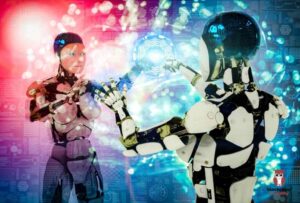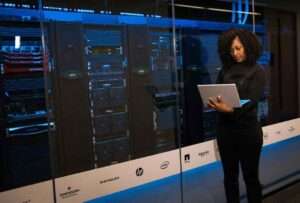Blockchain and AI (artificial intelligence) stand as two of the most disruptive technologies of our era. Each is already driving significant change across various industries. Their combined power holds the potential to redefine the future of technology.
In this post, we delve into the convergence of blockchain and AI, exploring how their integration is creating new opportunities and innovative applications.
Understanding Blockchain and AI
Blockchain is a decentralized, immutable ledger that records transactions across multiple computers, ensuring transparency and security. On the other hand, AI refers to the simulation of human intelligence by machines, enabling them to learn, reason, and solve problems. When combined, these technologies create a powerful tool for enhancing efficiency, security, and innovation across various industries.
How AI Enhances Blockchain
AI can significantly enhance blockchain technology by improving its efficiency and security. One of the main challenges of blockchain is its need for substantial computational power, especially for tasks like mining. AI algorithms can optimize these processes, making them faster and more energy-efficient.
Moreover, AI can help in managing and analyzing the vast amount of data stored on blockchains. Machine learning algorithms can sift through this data to identify patterns, predict trends, and make informed decisions, all while maintaining the integrity and security of the blockchain.
Blockchain as a Solution for AI Challenges
AI, despite its advantages, has its own set of challenges, particularly in areas like data privacy, security, and trust. Blockchain, with its decentralized and immutable nature, offers a solution to these challenges. By storing AI models and data on a blockchain, organizations can ensure that the data is tamper-proof and secure, thus increasing trust in AI-driven decisions.
Furthermore, blockchain can facilitate the creation of decentralized AI models, where data is shared across a network without compromising privacy. This is particularly useful in industries like healthcare, where sensitive patient data can be used to train AI models without exposing the actual data.
Real-World Applications of Blockchain and AI
The integration of blockchain and AI is already being explored in various sectors. For instance, in supply chain management, AI algorithms can predict demand and optimize inventory, while blockchain ensures transparency and traceability of goods. This combination leads to more efficient and reliable supply chains.
Here are some real-world application examples:-
Supply Chain Management: IBM Food Trust
IBM Food Trust uses blockchain and AI to track food products from farm to table, ensuring transparency and safety. AI algorithms analyze the data to predict supply chain disruptions and optimize logistics.
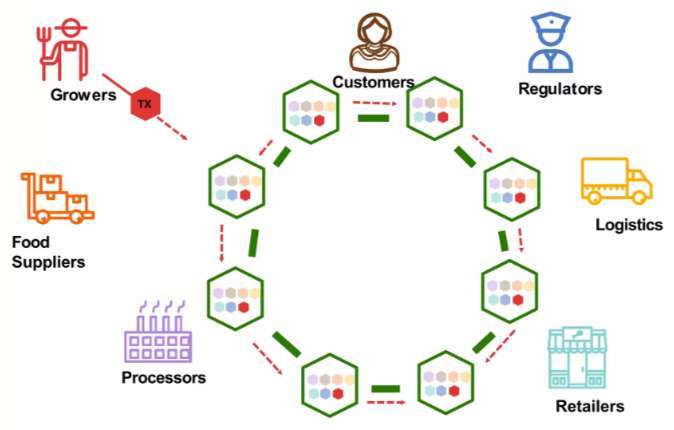
IBM Food Trust leverages blockchain technology to create an immutable and transparent record of every step in the food supply chain. From the farm where the food is grown, to the processing plants, and finally to the retailer, each transaction is securely recorded on the blockchain.
This ensures that every party involved in the supply chain has access to the same information, reducing the likelihood of errors or fraud. With IBM Food Trust, businesses can trace the journey of their products in real-time, offering unprecedented transparency that builds trust with consumers.
In addition to transparency, IBM Food Trust significantly enhances food safety. By providing detailed, traceable records, the system allows for quick identification of the source of any contamination or issue. This rapid traceability is crucial in preventing the spread of foodborne illnesses and enables swift recalls if necessary.
By ensuring that food products meet the highest safety standards from farm to table, IBM Food Trust not only protects consumers but also upholds the integrity of the entire supply chain.
View IBM Food Trust slideshare to learn more.
Financial Services: Compound and Aave (DeFi)
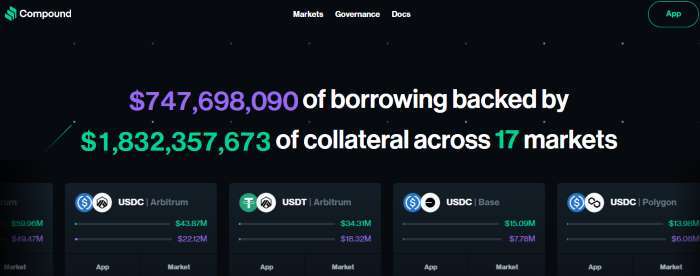
When it comes to financial services or decentralized finance (DeFi), there are many real-world examples but if one were to take a closer look at platforms like Compound and Aave, they use blockchain for decentralized lending and borrowing. AI is employed to analyze market trends, assess credit risks, and optimize investment strategies.
Exactly how the blockchain part works?
Compound uses blockchain technology to enable decentralized lending and borrowing through smart contracts, which automate and secure transactions without the need for intermediaries. These smart contracts handle everything from collateral management to enforcing loan terms, ensuring transparency and security through the blockchain’s immutable ledger.
Exactly how Artificial Intelligence (AI) is used?
AI enhances these platforms by analyzing market trends and on-chain activity. It assess credit risks, optimizes investment strategies and predicts market movements.
This allows for more dynamic interest rates, better portfolio management, and automated liquidation processes. All of which helps maximize returns and reduces risks for users.
By integrating AI and blockchain, DeFi platforms offer a more efficient, transparent, and secure financial ecosystem.
Visit Compound and Aave to learn more about how they are using Blockchain and AI.
Predictive Analysis: Chainalysis
Chainalysis is a blockchain analysis firm that uses AI to detect illicit activities and predict trends in cryptocurrency markets. Their AI tools help in tracking and analyzing blockchain transactions for compliance and security.
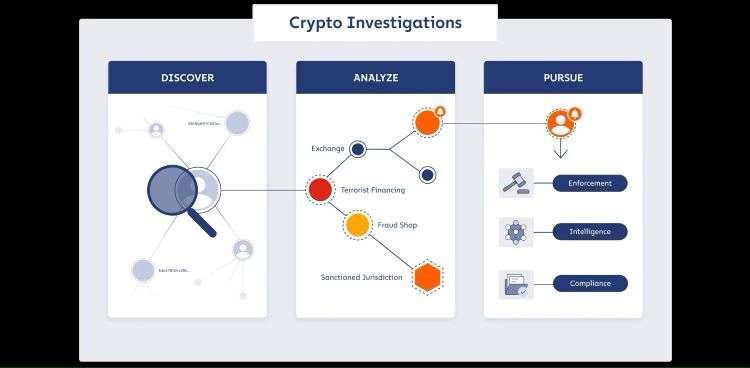
Chainalysis leverages sophisticated AI algorithms to enhance blockchain transaction analysis, focusing on identifying and mitigating illicit activities within cryptocurrency markets. Their AI-driven tools continuously monitor and analyze transaction patterns across various blockchain networks.
By employing machine learning techniques, Chainalysis can detect unusual patterns that may indicate fraudulent activities, money laundering, or other forms of financial crime. For instance, if a transaction pattern mirrors known money laundering techniques or deviates from normal behavior, the AI system flags it for further investigation.
This proactive approach helps in preventing illicit activities before they escalate, ensuring greater compliance and security in cryptocurrency transactions.
In addition to real-time monitoring, Chainalysis uses AI to predict emerging trends in the cryptocurrency market. By analyzing historical data and current transaction patterns, their AI models can forecast potential future threats or shifts in criminal tactics.
This predictive capability is crucial for financial institutions and regulatory bodies. It allows them to stay ahead of evolving threats and implement appropriate countermeasures. Chainalysis also provides detailed reports and actionable insights based on their AI analysis. This in turn aids in regulatory compliance and enhances the overall security posture of their clients against illicit activities.
Visit Chainalysis to learn more.
The Future of Blockchain and AI
The synergy between blockchain and AI is still in its early stages, but the potential is enormous. As these technologies continue to evolve, we can expect to see more innovative applications that will transform industries and create new opportunities. From enhancing cybersecurity to enabling decentralized AI platforms, the future of blockchain and AI is bright and full of possibilities.
For businesses and organizations looking to stay ahead of the curve, it is essential to explore how these technologies can be integrated into their operations. By leveraging the strengths of both blockchain and AI, they can achieve greater efficiency, security, and innovation, paving the way for a more advanced and interconnected world.
Conclusion
Blockchain and AI are not just buzzwords; they are the building blocks of the future. Their integration offers unprecedented opportunities to enhance the way we store, manage, and analyze data.
As the technology landscape continues to evolve, those who harness the power of blockchain and AI will be at the forefront of innovation. Whether in finance, supply chain, or any other industry, the synergy of these technologies is set to revolutionize the way we live and work.
- Ai, Fintech and Blockchain Adoption: Malaysia vs Indonesia - October 11, 2024
- Blockchain and AI Synergy: Future of Technology - August 22, 2024
- Blockchain Security: Threats and Best Practices - July 15, 2024

